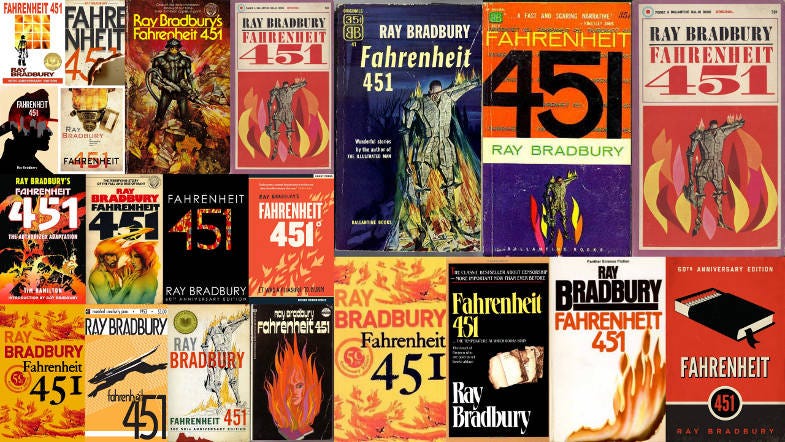Table of Contents
I’ve been a little slower to publish this week, for a number of reasons. There’s the round of holiday visits; there’s the fact that our school-age children, like most of the kids in the strike-bound province of Quebec, have been home for weeks, and are avid for diversion; and I’ve been sick (nothing serious, just an energy-sapping cold).
And then there’s what’s become known as Substack’s “Nazi Problem.” Cocooned in the Christmas bubble, I was slow to read Jonathan Katz’s article in The Atlantic. “An informal search of the Substack website,” Katz wrote, “turns up scores of white-supremacist, neo-Confederate, and explicitly Nazi newsletters on Substack—many of them apparently started in the past year.”
My first reaction to such news is an instinctive, Indiana-Jones-style growl: “Nazis?! I hate those guys.” The book I wrote before my latest, The Lost Supper, was a non-fiction account of the anti-fascist resistance in 1920s Italy, entitled Possess the Air: Love, Heroism, and the Battle for the Soul of Mussolini’s Rome. (It sold like, literally, dozens of copies; what can I say, I was on a mission.) I spent three years on that book, during the darkest days of the Trump regime, and the research at archives in Italy deepened my unalterable loathing of the far right, and made me very wary of tendencies in our societies that could be leading us back to authoritarianism.
So, let me say, in the least equivocal way possible: Fuck Fascists.
That said, I’m a deep, deep believer in freedom of expression. This goes back to my earliest years of literacy, when some natural orneriness and curiosity set me seeking out the limits of knowledge and expression. I read so-called obscene authors, from Georges Bataille to Charles Bukowski, I got my hands on a copy of The Anarchist’s Cookbook, I read the Earth First! Manifesto, as well as the Unabomber’s tract, I even read some fascist and racist authors (Louis-Ferdinand Céline and Knut Hamsun come to mind). I was disgusted when bookstores like Little Sisters in Vancouver, the city where I grew up, were raided by the police for selling soi-disant obscene literature (books by LGBTQ+ authors, in other words). One of the worst images of 20th century terror for me was jackbooted Nazis throwing great works of literature into bonfires. I read Ray Bradbury’s Fahrenheit 451, in which firemen in an idea-phobic dystopia are called to put books to the torch, as a warning: I would never allow a book, no matter how repugnant the ideas it expressed happened to be to me, to be destroyed by zealots.

Would I rescue a Mein Kampf from the bonfire? Yes, I guess, though not with alacrity—I’d reach for the smouldering Tolstoys first.
That said, Nazi rants, ugh.
So, here are the thought-experiments I’m running in my head these days.
Q. Would I patronize a library with tens of thousands of volumes, which included Hitler’s odious works of racist ideology?
A. Yes, I already do. The university library I teach at has such books. Their presence is essential for scholars.
Q. Would I enter a bookstore that had such works—in other words, that profited from the sales of such books?
A. Perhaps—if it also sold books by anarchists, Maoists, and free-market libertarians, and did so in the name of free expression. (If it was devoted to far-right literature, I probably would never cross the threshold. But I wouldn’t fight for its closure; people who thought they were working in the name of their conception of “good morals” tried to have Little Sisters, and too many bookstores like it, shut down).
Q. If the publisher of my books began to publish books odious to me (say, Mussolini’s first novel, or a reprint of Trump’s The Art of the Deal), would I leave that publisher?
A. Perhaps—but if it had a massive catalogue, and was also publishing The Anarchists’ Cookbook, and flat-earthers’ manifestos, and Aleister Crowley’s Diary of a Drug Fiend, I’d probably say to myself: “Interesting; what a deep commitment to freedom of expression.” If the same publisher suddenly decided that it was going to specialize in a small roster of frothing-at-the-mouth white supremacists, to the exclusion of all others, though, I would be gone in a flash.
Which leads to the question: Is Substack a publisher? Their economic model suggests they are: they take a cut—in a nice inversion of standard publishing deals, 10, rather than 90, percent of the usual writer’s take—of the subscription fees paid by readers. But as the author of eight books, and hundreds of articles, I can tell you that, if what they are doing is “publishing,” then Substack is the loosest example of a publisher I’ve ever encountered. I thought the Huffington Post was the nadir of editorial negligence—anything I wrote for them was thrown up on the web within half an hour of submission, typos and errant commas intact. On Substack, there is no editing or supervision at all. I’m sure they don’t know, or care, that my dispatches on transit and food history exist. And I’m fine with that: I’m warming to the breezy independence of editor-free journaling, or blogging, or whatever the hell this public-dispatch-writing is.
As some absinthe distillers in the Swiss Val-de-Travers once told me: “Pour vivre heureux, vivons cachés.” To live happily, live in hiding.
But here’s the thing: the Fascists aren’t hidden from view any more—Substack knows that it’s publishing the hateful words of Nazis, because they’ve been abundantly alerted to the fact. And, after a pregnant pause, their considered response, is, essentially: “We’re not going to do anything about it.” So they know they’re getting a 10% cut of the subscription fees from the readers and supporters of these hate-filled individuals. Substack currently platforms 17,000 writers, of which 0.4% (if Katz is right, and there are scores of Nazis on the site) may be expressing odious far-right views.
I understand that Substack’s founders could turn around and say: Well, we have a lot of writers expressing anarchistic views, or inciting people to smash the state, or writing the kind of prose that religious fundamentalists consider obscene—should we then ban them, too?
It’s a valid question.
Still, though—Nazis. Fuuuucck.
Here’s where I’m at. I long ago stopped posting new content on Twitter (yeah, I’m dead-naming that dead-to-me site) because I don’t want to craft content for the continued profit of one of the world’s most abominable trolls. (I did not delete my account, though, because my own way of trolling the site is to periodically direct any remaining followers on Twitter to my Substack.) But now I’m put in the position of debating whether to stay on another platform because some of its users are expressing ideas that are odious to me. If I do that, though, and if a lot of writers like me also leave, one thing is certain: in relative terms, the percentage of Fascists on Substack is going to be a lot higher. And in that sense, the Fascists will have won.
If Substack does face up to the fact that it is a publisher—and I think it should—it can make a decision that all publishers are free to make: Should we keep on spreading the words of these awful, awful individuals? And in the case of Nazis, the answer should always be a hard “no.” If I were in the same position as Substack’s founders, Chris Best, Jairaj Sethi, and Hamish McKenzie, I wouldn’t even hesitate: I would ban the Nazis. If you’re having trouble deciding which ones to prioritize, Hamish, let me suggest that a Swastika logo on a homepage is a dead giveaway.
Here’s why Fascists and Nazis are in a special category, and in my opinion fall outside of “freedom of expression” arguments. As their rise in Italy and Germany shows, they exploit the institutions of democracy, including a free press, to rise to power. When they succeed, they banish those institutions, shutting down democratic elections and instituting mass censorship. That’s why allowing Fascists and Nazis to run for national office is an absurdity—by doing so, a nation is opening the door for the dismantlement of democracy. And by publishing them, in a newspaper or on a platform like Substack, you’re opening the door—by a tiny but highly exploitable crack—to the shutdown of a free press, and to the censorship of all views the Fascists disagree with. Publishing Nazis and Fascists is giving voice to those who would shut down all freedom, and all expression.
I’m sure the Nazis will find their own platform—just as Trump “found” Truth Social—one where they can freely express their own evil ideas to like-minded readers. There’s no reason, though, that they should express them on Substack.
And, to you, dear reader: if you’re uncomfortable with the idea that any of your money might end up in the pocket of a Fascist, I’ll respect your decision to go to another website.
Sometimes fighting for change from within is a waste of time—that’s certainly the case with Twitter, now that the Musk-man is its presiding spirit; the whole project was tainted by his takeover. But I sense that’s not the case with Substack, and I’m going to stick around. For now, at least. But I’ll be watching the skies around me very carefully, and if I look up and see too many vultures gathering, I’ll definitely be reconsidering my position.
(Thanks for bearing with me: I’ll be returning to my regularly scheduled dispatches in the days to come.)






